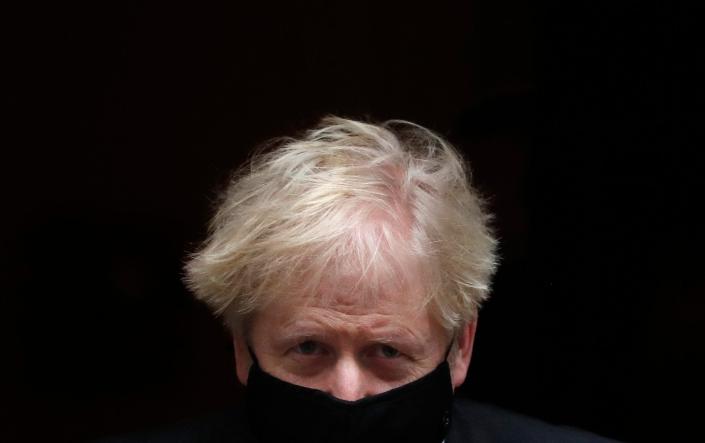
People knew what they were doing when they voted for Boris Johnson in 2019. They knew he was a troublemaker, a corner cutter, a man who had no time for standards or niceties. They felt that, like Nietzsche’s Blonde Beast, Johnson transcended the rules. And they got exactly what they voted for. It was these qualities that led Johnson to break the deadlock in Parliament, beat Jeremy Corbyn and deliver Brexit. It was its impatience with the process that gave Britain the fastest vaccine rollout of any major country on the planet.
Johnson’s wins left his opponents stunned. They had called him a jester. Yet he took his party from 8.8% of the vote in the 2019 European elections to 42.4% seven months later, and then led Britain out of their beloved EU. The figure they had mistaken for a clown knocked them out, not with a swollen bladder, but with a real crowbar, leaving them broken. No wonder they wanted revenge.
When I say ‘they’ I mean those who have never come to terms with Brexit: Conservative and Opposition MPs, broadcasters, columnists and, not least, many senior civil servants. Against this conspiracy of greats, Boris had a time his mandate. Many Tories knew that people who would never vote ‘Tory’ had been happy to vote ‘Boris’.
But, when the pandemic hit, the mood changed. A frightened country was in no mood for jokes, and the qualities that had drawn people to Johnson in the first place – his cheerfulness, his ability to laugh at himself, his optimism – began to creak. Boris was suddenly stuck as a Falstaff in a newly populated nation of Malvolios.
As the lockdown dragged on, fear gave way to resentment. Even those who had demanded the harshest restrictions began to chafe at their consequences, looking for someone to blame. It was Johnson’s supreme misfortune to storm into their crosshairs at this precise moment, accused of breaking the rules he had imposed on everyone else. The Prime Minister, it seemed, had partied as his period separated families and kept people from dying.
Such was the atmosphere that qualifications and defenses became impossible. Nobody wanted to hear that a break at the office with colleagues was not, in the normal sense of the word, a party. No one wanted to be reminded that other key workers had posted happy dancing videos. No one wanted to be told that Johnson, too, had gone without a hospital visit and was barred from seeing his own mother, who died shortly afterwards – which he had, in fact, obeyed the same rules as the rest of us.
No, we wanted a sin eater, a scapegoat. And who better than the man who had been pushed to enact containment in the first place?
Ah, you say, but the investigation of the Committee of Privileges does not concern these things. This is not about the 2019 election or Brexit. It’s not about whether people sang Happy Birthday to Johnson in the Cabinet Room. The narrow question is whether he misled Parliament.
Now, misleading Parliament is unforgivable. A member can get away with being drunk or committing adultery, but not lying at the shipping box. All kinds of sins and blasphemies will be forgiven men, but blasphemy against the Holy Spirit will not be forgiven men. Yet I cannot for the life of me see, based on the evidence they heard, how the committee can ever conclude that the former prime minister concocted a deliberate lie.
There was one occasion when Johnson told MPs that ‘no matter what, the advice was followed and the rules were followed at all times’. He may have puffed his lines this time around, as it seems his briefings only referred to rules, not advice. But does it seem plausible to you that this is a calculated deception rather than imprecise wording?
You could say I’m doing what I accuse Johnson’s haters of doing, which is to determine his guilt or innocence based on whether I like him or not. And it is certainly true that, just as those who most clamored for his removal were generally already anti-Boris and anti-Brexit, those who insist on his innocence are making no secret of their desire to see him back in Downing Street. Well, not me. Once you quit, you quit. Loving like I am my former Telegraph colleague, he had his chance.
I also don’t buy into the idea that we are somehow ruled by a cabal of wet Euro-nostalgics. Rishi Sunak, unlike Johnson, is a longtime eurosceptic. As Chancellor, he tried to stop the then Prime Minister from writing checks left, right and centre. It was thanks to the Thatcherite Chancellor, not the spendthrift Prime Minister, that we weren’t locked down again when, in late 2021, scientists scared the hell out of Omicron.
The willingness of some Johnsonians to blame the current prime minister for the findings of an independent committee does them little credit. It’s not about Sunak. It’s about the absurd way politicians can be overthrown by committees of other politicians, including their opponents. The question is whether a minister can in the future have his career interrupted for having said something in good faith which later turns out to be incorrect.
It is, in the end, a question of whether a serious country throws its leader out, not because it impoverished him, or because it lost a war, or because it broke its promises. , but because it was found near an uneaten cake. Who are the real clowns here?
Broaden your horizons with award-winning British journalism. Try The Telegraph free for 1 month, then get a year for just $9 with our exclusive US offer.
